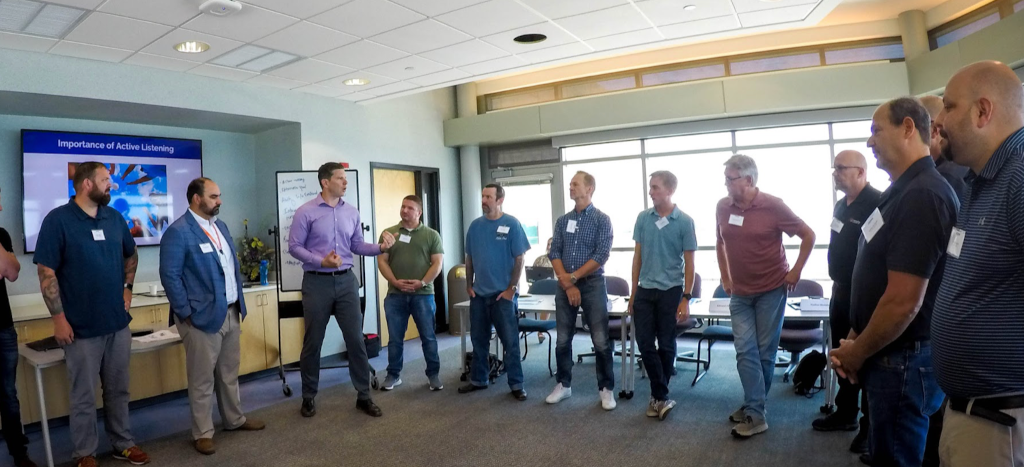
Customized Training to Advance Your Company’s Greatest Asset
The Center for Advanced Engineering Education’s staff closely collaborates with corporate partners to design educational training opportunities for your engineers and other valuable employees.
Working together with your company and UConn faculty, we develop customized training and development programs to meet the specific training needs of corporations. By identifying the training needs of your company, we develop curriculum and course content, and deliver a tailored program to address your individual training objectives.
View the video on the College of Engineering Communication Workshops
By providing employees with training programs that enhance their communication skills, organizations can facilitate clearer and more efficient information exchange, leading to improved collaboration, problem-solving, and decision-making processes.
Secondly, strong communication skills contribute to a positive workplace culture and employee engagement. When employees feel heard, understood, and valued, they are more likely to be motivated, satisfied, and loyal to the organization. Communication training programs can empower employees to express their ideas, concerns, and feedback confidently, promoting a culture of open dialogue and mutual respect.
Finally, effective communication mitigates conflicts and misunderstandings, reducing the likelihood of costly errors, delays, and inefficiencies. By investing in communication excellence, organizations can improve internal and external communication channels, leading to enhanced customer satisfaction, stronger relationships with stakeholders, and ultimately, improved organizational performance and profitability.
Effective communication enables engineers to articulate complex technical concepts to diverse audiences, collaborate seamlessly with multidisciplinary teams, and engage stakeholders to drive successful projects. By mastering contemporary communication tools and techniques, engineers can bridge the gap between technical expertise and practical application, translating their ideas into tangible solutions.
Moreover, strong communication skills enhance their ability to influence decision-making, build relationships, and inspire innovation. In an interconnected global landscape, engineers who prioritize and develop their communication skills gain a competitive advantage, unlocking new opportunities and propelling their professional and organizational growth.
Additionally, effective communication and leadership is crucial for engineering organizations to run their business smoothly as it ensures seamless collaboration among teams, enabling efficient sharing of information, ideas, and project updates. It also facilitates clear client communication, ensuring that project requirements are understood, expectations are managed, and deliverables are met, leading to successful outcomes, client satisfaction, and future business development.
The EEC Program aims to achieve a wide range of objectives, including, but not limited to:
- Enhance Clarity: Enable engineers to communicate complex technical concepts and ideas clearly and concisely to non-technical stakeholders within the organization.
- Foster Collaboration: Develop effective communication strategies and techniques to facilitate collaboration among interdisciplinary teams, ensuring seamless information exchange and alignment of goals and completion of projects.
- Strengthen Presentation Skills: Equip engineers with the skills to deliver engaging and impactful presentations, enabling them to effectively convey their ideas to diverse audiences within the organization.
- Cultivate Active Listening: Foster active listening skills among engineers, promoting better understanding, empathy, and constructive dialogue within interdisciplinary teams.
- Bridge Communication Gaps: Develop strategies to bridge communication gaps between engineers and non-technical colleagues, facilitating effective collaboration and minimizing misunderstandings.
- Promote Effective Written Communication: Improve written communication skills of engineers to ensure the clarity, accuracy, and coherence of project reports, technical documentation, and emails.
- Refine Interpersonal Communication: Enhance interpersonal communication skills, including effective questioning, feedback, and conflict resolution, to promote positive and productive interactions within interdisciplinary teams.
- Adapt Communication Styles: Enable engineers to adapt their communication styles and techniques to different stakeholders, considering their backgrounds, roles, and communication preferences.
- Develop Persuasive Communication: Equip engineers with persuasive communication strategies and techniques to influence decision-making, garner support for projects, and drive innovation within large organizational settings.
- Enhance Cross-Cultural Communication: Provide engineers with the tools and knowledge to navigate cross-cultural communication challenges within diverse organizational environments, fostering inclusivity and effective collaboration.